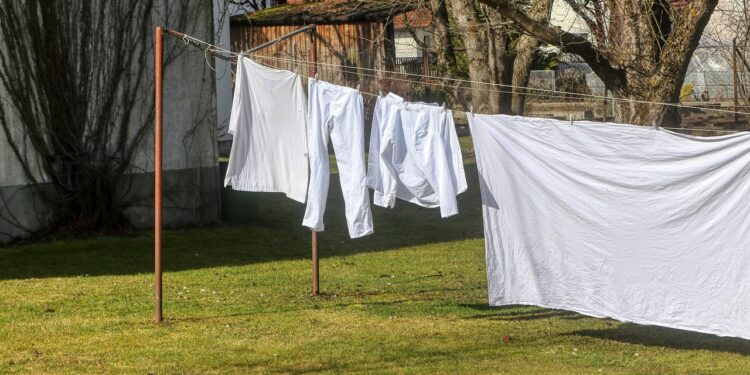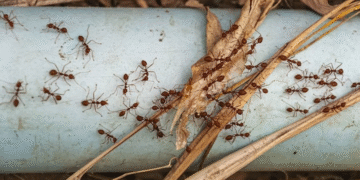Summer brings sunshine, outdoor activities, and unfortunately, smellier clothes. If you’ve noticed your laundry has a stronger, more persistent odor during hot months, you’re not imagining things. Understanding why this happens and how to combat it will keep your clothes fresh all season long.
What Causes The Bad Smell?
Your clothes smell worse in summer because heat and humidity create perfect conditions for bacterial growth. When you sweat more in hot weather, your clothes absorb moisture along with body oils, dead skin cells, and salt. These organic materials become food for bacteria that naturally exist on your skin and in the environment.
Higher temperatures speed up bacterial reproduction. What might take days to develop a smell in winter can happen within hours during summer. The bacteria break down sweat and oils, producing waste products that create those unpleasant odors. This process continues even after you take your clothes off, especially if they stay damp.
Humidity makes everything worse. When air moisture levels are high, sweat doesn’t evaporate quickly from your skin or clothes. Instead, it sits there, creating a breeding ground for odor-causing microorganisms. Synthetic fabrics like polyester trap moisture more than natural fibers, making the problem even more noticeable.
Why Regular Detergent Isn’t Enough
Standard laundry detergent cleans surface dirt but often fails to eliminate the bacteria and oils embedded deep in fabric fibers. During summer, you need more than basic cleaning power. Regular detergent may remove visible stains but leave behind microscopic bacteria that continue producing odors.
Cold water washing, while energy-efficient, doesn’t kill bacteria effectively. Most detergents work better in warm water, but many people avoid it to prevent shrinking or fading. This creates a cycle where clothes never get truly clean, and odors build up over time.
Fabric softeners can actually make summer odor problems worse. They coat fibers with waxy residue that traps bacteria and prevents proper cleaning in future washes. This coating also reduces fabric breathability, making you sweat more when wearing treated clothes.
Essential Summer Laundry Techniques
Start by washing clothes immediately after wearing them. Don’t let sweaty clothes sit in hampers or gym bags where bacteria multiply rapidly. If you can’t wash right away, hang clothes to air dry completely before storing them. For delicate fabrics that require dry cleaning and laundry care, follow the same immediate removal principle but take them to professionals within 24 hours of wearing.
Use warm water when fabric care labels allow. Water temperature between 80-90°F kills most odor-causing bacteria without damaging clothes. For heavily soiled items, pre-treat with enzyme-based stain removers that break down protein-based stains from sweat.
Add white vinegar to your wash cycle once weekly. Pour half a cup into the fabric softener compartment during the rinse cycle. Vinegar’s acidity neutralizes odors and removes detergent buildup that can trap smells. Don’t worry about the vinegar scent, it disappears completely when clothes dry.
Increase your detergent amount slightly during summer months. Use the recommended amount for heavily soiled loads rather than lightly soiled ones. This extra cleaning power helps combat the increased bacteria and oil production from summer activities.
The Power of Proper Drying
Never leave wet clothes in the washing machine. Bacteria thrive in warm, moist environments, and a closed washer drum is perfect for odor development. Transfer clothes to the dryer or clothesline immediately after the wash cycle ends.
When air-drying, choose locations with good airflow and avoid humid areas like basements or bathrooms. Direct sunlight naturally kills bacteria and helps eliminate odors. If using a dryer, ensure clothes are completely dry before folding; even slightly damp fabric can develop musty smells.
Clean your dryer’s lint trap after every load. Clogged vents reduce airflow and increase drying time, creating conditions where bacteria can survive the drying process. Deep clean your dryer vent annually to maintain proper function.
Targeting Stubborn Summer Odors
For clothes with persistent odors, create a pre-wash solution using baking soda and water. Mix three tablespoons of baking soda with one cup of warm water and soak affected garments for 30 minutes before washing normally. Baking soda neutralizes acids produced by bacteria.
Enzyme detergents work exceptionally well for protein-based stains and odors from sweat. These specialized cleaners break down the molecular structure of organic materials that bacteria feed on. Use them according to package directions for best results.
Consider washing workout clothes and undergarments separately from other items. These pieces typically have the strongest odors and benefit from specialized treatment. Use the hottest water safe for the fabric and add an extra rinse cycle to ensure complete cleaning.
Prevention Strategies
Choose natural fiber clothing when possible during summer. Cotton, linen, and wool allow better air circulation and absorb moisture differently than synthetics. These fabrics also respond better to high-temperature washing that kills bacteria effectively.
Shower immediately after exercising or spending time outdoors. The longer sweat stays on your skin, the more bacteria multiply and transfer to your clothes. Change into fresh clothes after showering rather than putting on items worn during activities.
By understanding why summer creates more odor challenges and implementing these targeted laundry strategies, you’ll keep your clothes smelling fresh regardless of temperature or humidity levels.













